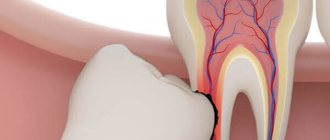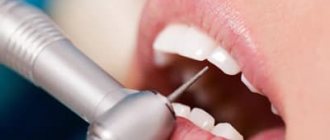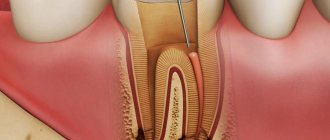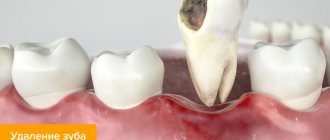Date of publication: 09.24.2018
A dental cyst is a sac in the bone tissue filled with pus. At the early stage of its appearance, a person experiences only pain when pressed. Lack of treatment aggravates the situation and after some time the symptoms change:
- - Constant pain appears;
- - Swelling around the tooth;
- — Increased temperature;
- — Flux;
- - Active formation of pus.
In this case, you urgently need to consult a doctor.
Home methods for treating cysts
Folk remedies (ointments, decoctions and lotions) will help with this diagnosis only in the early stages. This treatment can be used during pregnancy. Therapeutic measures cannot be the main ones, but they can be used for preventive purposes or when the first symptoms of the disease appear.
Traditional medicine recipes are simple. Rinse your mouth with alcohol-containing solutions, vodka tinctures of calendula and aloe. You can buy such products at a pharmacy or make your own. Chamomile, sage, yarrow and calendula disinfect the oral cavity and help eliminate acute pain. A concentrated decoction is prepared from them - two tablespoons of herbs per cup of water. Warm decoctions (not hot) can be prepared with the addition of salt. These remedies will help eliminate swelling.
You should know that home treatment will not get rid of the problem completely. Folk remedies can be a useful addition, in combination with basic methods to improve the condition, reduce symptoms and speed up recovery.
If a cyst causes a fistula, home measures are necessary.
Purpose of using home measures:
- reduce pain;
- reduce or eliminate inflammation;
- get rid of infection;
- disinfect the oral cavity to prevent the development of an inflammatory process.
Traditional methods of treatment include ointments, compresses and lotions.
The choice of treatment method is determined by the type of formation and its symptoms.
- Healing herbs
Chamomile, mint, eucalyptus and horsetail are used to prepare decoctions.
Rinsing can be done many times; there are no restrictions on this issue. They act as an anti-inflammatory and antibacterial agent and can reduce discomfort and pain.
- Sesame
Sesame oil has the ability to draw out inflammation and reduce the number of harmful bacteria. If you keep a small amount of it in your mouth (without swallowing), further development of the infection will stop.
- Garlic
This plant is famous for its antimicrobial properties, ability to heal wounds and improve gum health by reducing the number of germs.
Rubbing the affected areas, chewing, or even including garlic in the daily menu has a beneficial effect on the condition of the gums.
- Horseradish and alcohol
The rinse composition is prepared from half a glass of chopped horseradish, supplemented with alcohol. Insist for 3 days.
- Clove oil
Pharmaceutical clove oil is applied to the problem area, soaking gauze swabs. You need to keep this lotion for about half an hour.
- Salty water
Saline solution relieves inflammation. To rinse, dilute a tablespoon of table salt in a glass of water. You need to rinse frequently.
- Lemon water
A tablespoon (or more) of lemon juice is added to a glass of boiled water. When rinsing, the product is retained in the mouth.
- Honey with rust
A hot nail is dipped into honey. A special substance forms around it, resembling rust in appearance. It is applied to the affected area.
When choosing a remedy, you need to remember that they are more suitable as preventive measures. The cyst cannot be completely removed in this way. If a cyst develops, it is important to eliminate any risks and seek help from a professional dentist.
General information
Without exception, all home and folk methods for treating cysts are aimed at getting rid of the cause of this disease.
. Therefore, we are not talking about tooth extraction or loss here. Almost always it is either rinsing with various solutions or decoctions, or various lotions.
The most popular remedies for treating dental cysts are lemon juice, sesame oil, some essential oils, myrrh, chamomile, sage, soda, salt.
and others. Tinctures and solutions are prepared according to different principles, and, in addition, the time is not the same in each case.
To create rinse solutions, the concentration of active ingredients is very important, so you need to strictly follow the recipe.
Another reason to turn to folk remedies is their reasonable cost. After all, a fairly large proportion of people who do not seek specialized dental care simply consider these services and activities to be unreasonably expensive. And in many cases this is true.
We will tell you what the symptoms of a dental cyst are in general in a separate review.
This article talks about the most effective ways to treat flux at home.
Here: https://www.vash-dentist.ru/lechenie/zubyi/naznachaemyie-pri-boli-antibiotiki.html - the names of antibiotics taken for toothache are listed.
One more feature of self-treatment at home should be discussed. It almost always stretches out over a fairly long period of time.
. This is due to the lack of direct access to the site of the disease. Here, the effect of drugs is carried out through the penetration of small doses of active substances through the tissues.
Therefore, if the patient expects the fastest possible result (within a few days), he should contact a specialist at the dental clinic. Moreover, the procedure for getting rid of a cyst is quite simple - watch the following video:
Complications
If you do not know how to treat a cyst and do not take any measures to eliminate it, this can lead to serious consequences. The most common of them are:
- Tooth loss.
- Jaw deformation.
- Sinusitis.
- Osteomyelitis.
- Abscess.
- Sepsis.
- Jaw fracture.
- Decreased quality of hearing or its complete disappearance (the occurrence of this complication is caused by the spread of purulent processes to the hearing aid).
Considering the high risks of developing all these complications, it is necessary to treat this disease as soon as the first signs of its occurrence appear.
Clinical researches
Repeated clinical studies have proven that the two-component mouth rinse ASEPTA ACTIVE more effectively combats the causes of inflammation and bleeding compared to single-component rinses - it reduces inflammation by 41% and reduces bleeding gums by 43%.
Sources:
- The role of anti-inflammatory rinse in the treatment of periodontal diseases (L.Yu. Orekhova, A.A. Leontyev, S.B. Ulitovsky) L.Yu. OREKHOVA, Doctor of Medical Sciences, Prof., Head of Department; A.A. LEONTIEV, dentist; S.B. ULITOVSKY, Doctor of Medical Sciences, Prof. Department of Therapeutic Dentistry of St. Petersburg State Medical University named after. acad. I. P. Pavlova
- Report on the determination/confirmation of the preventive properties of personal oral hygiene products “ASEPTA PLUS” Remineralization doctor-researcher A.A. Leontyev, head Department of Preventive Dentistry, Doctor of Medical Sciences, Professor S.B. Ulitovsky First St. Petersburg State Medical University named after. acad. I.P. Pavlova, Department of Preventive Dentistry
- Clinical studies of antisensitive toothpaste “Asepta Sensitive” (A.A. Leontyev, O.V. Kalinina, S.B. Ulitovsky) A.A. LEONTIEV, dentist O.V. KALININA, dentist S.B. ULITOVSKY, Doctor of Medical Sciences, Prof. Department of Therapeutic Dentistry, St. Petersburg State Medical University named after. acad. I.P. Pavlova
Tincture of calendula
The plant has anti-inflammatory and antiseptic properties. Calendula contains substances that help tissues recover. In addition, it relieves pain well.
To prepare the tincture you will need water and a tablespoon of dried flowers. The water must be boiled and poured into the inflorescences. Then let it brew for at least 60 minutes. Then the future tincture needs to be filtered and cooled. Rinse your mouth with the resulting liquid until the pain subsides.
Sage decoction
Thanks to its components, the plant kills all microbes. Also, the effect of sage is aimed at strengthening tissues and eliminating inflammation.
You may be interested in: The best orthodontist in Kazan
For the decoction you need to take a glass of water and a tablespoon of sage powder. Then fill it with water and heat it in a water bath - this should be done for 20 minutes. Then the broth is filtered and boiling water is poured into it so that you end up with a glass of liquid. The product should be used when it has cooled to body temperature.
Horsetail tincture
This plant is endowed with a lot of beneficial properties, one of the main ones being its anti-inflammatory effect. The herb also helps reduce swelling.
To prepare, you need dry horsetail - a couple of tablespoons and two glasses of water. The horsetail is placed in a container and filled with water. Then put on the fire, where the mixture is brought to a boil and kept on the stove for several minutes. Then the resulting liquid is filtered and cooled.
Thyme infusion
Products even with a minimal content of this plant have an antimicrobial effect.
To prepare a miracle remedy, you will need dried thyme - ⅓ of a glass and a liter of boiled water. The liquid must be put on fire and boiled, and then pour it over the thyme, allowing the plant to brew for 60 minutes. Next, strain and use the decoction warm.
What types of cysts are there?
Depending on the location of the cyst, several types are distinguished. The most common:
- Radicular. A tooth root cyst, which can form as a result of infection from the oral cavity through the canals.
- Residual. Also called residual, after tooth extraction, the remains of the root become inflamed, which the body stops in a “bag”.
- Follicular. Inherent in a growing organism. During the formation of tooth tissue, disturbances occur and a cyst appears. Typically no symptoms. In this case, the cyst is removed.
Effective oil compresses
Oils are one of the best remedies for eliminating pain and redness. They are used not only for treatment, but also for removing bad breath. The most effective oils are:
- Sesame.
- Lemon.
- Clove.
- Eucalyptus.
- Almond.
It is very important for treatment purposes to use oils purchased at a pharmacy, and in no case should you use those purchased in cosmetic departments.
To make a compress, you need to choose any of the oils and apply a small amount to a cotton pad. Then apply it to the area of pain for 15 minutes, and after the time has elapsed, rinse your mouth thoroughly with water.
Clove oil also has medicinal properties. It relieves swelling well and significantly reduces the area of inflammation. Tea tree and bergamot oils have similar properties. To make a compress, you need to make a tampon from gauze, which you then moisten with oil and apply to the problem part for half an hour.
A compress of clove and sesame oils is an excellent remedy for cysts. Sesame oil contains many minerals and vitamins. In combination with clove, they act much faster and more reliably. For a compress you will need to take one tablespoon of each of these oils. Then, one by one, starting with sesame, take the substance into your mouth and hold for 10 minutes.











